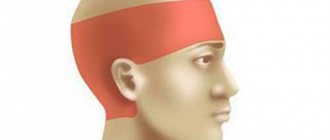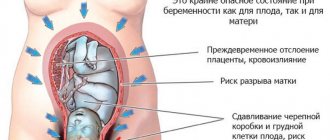How to get rid of headaches during pregnancy
Therapy for any spasm is based on taking painkillers and anti-inflammatory drugs. However, not all headache pills are allowed to be taken during pregnancy. It is especially dangerous to use chemicals before the placenta has fully matured. The pharmacology of analgesics and non-steroidal drugs is such that these headache pills during pregnancy can lead to unpredictable consequences for the woman and her unborn child. The problem is complicated by the fact that medications are often used by analogy without taking into account the cause of the disease, which may be due to:
- increased or decreased blood pressure;
- malnutrition;
- osteochondrosis;
- migraine;
- sudden mood swings;
- long hours of work at the computer;
- hormonal changes;
- insomnia;
- frequent stress.
The danger of using medications often provokes pregnant women to use unconventional methods of therapy for headaches. Traditional recipes rarely have side effects, but their components still need to be checked for allergenicity. Preference should be given to herbal teas and sedatives. It is strictly forbidden to use infusions of fenugreek and raspberry leaves before the third trimester of pregnancy. These plants have an abortifacient effect. Recommended use:
- aromatherapy with rose, lavender, lemon oils.
- herbal teas from currants, lingonberries with honey.
- salt foot baths;
- bloodletting at points above the waist;
- acupuncture.
Other drugs
Strictly speaking, the list of headache pills for “ladies in an interesting position” is limited to these two drugs. Of the conditionally approved drugs, that is, those whose negative effects have not been proven, but doctors have concerns, we can name Ibuprofen and its derivatives - Nurofen, Brufen and others.
This drug is less effective than paracetamol. It is allowed to take up to 1300 mg per day for 3 days in the first and second trimester, and it is completely undesirable to use it in the last months of gestation due to a possible negative effect on fetal development. Contraindications are also kidney and liver diseases, decreased blood clotting, and individual intolerance.
You will have to forget about such common and widely used medications as Citramon, Analgin, Aspirin (acetylsalicylic acid), Ergotamine, Baralgin, Motrin and many others while carrying a child. Their use is strictly prohibited for expectant mothers due to the high risk of delayed fetal development and the possibility of very serious anomalies - from pathological changes in the blood picture to heart defects and circulatory system defects, bone deformations. Also, some of these drugs can cause uterine bleeding and spontaneous miscarriages.
Of course, one “head pill” during pregnancy won’t do any harm. But if headaches occur frequently and periodic medication is required, then you should definitely consult an obstetrician-gynecologist and undergo an examination to determine the possible cause of the ailment.
Only a doctor can prescribe the most effective and safest treatment for you and your baby.
What pills can you take during pregnancy for headaches?
The prescription of any medications by doctors depends entirely on their pharmacodynamics and the degree of formation of the placental protection of the fetus. Tablets for headaches during pregnancy must meet safety and effectiveness criteria, which cannot be said about many medications presented in the pharmacy chain. For this reason, expectant mothers should coordinate the use of any medications with their doctor. Answering the question of what pregnant women can do for pain, experts say:
- Citramon;
- Ibuprofen or Nurofen;
- No-shpu;
- Paracetamol;
- Pentalgin;
- Ketonal;
- Ibuklin;
- Tempalgin;
- Panadol.
It should be said that Pentalgin and its analogues must be used with caution. These pills for severe headaches during pregnancy are a group of caffeine-containing medications that are often prescribed for spasms caused by migraines. Such drugs should not be taken in case of gestosis with high blood pressure. Against this background, the use of Paracetamol will seem harmless.
Articles on the topic
- Platiphylline - instructions for use, dosage, mechanism of action, contraindications and reviews
- Tablets for osteochondrosis: types and uses
- Spazgan - instructions for use of tablets, active ingredient, contraindications and reviews
Citramon in the early stages
It is quite safe to treat headaches with this drug, but in the second trimester, when the effect of caffeine on the fetus will be blocked by the placental filter. Citramon quickly helps eliminate severe headaches resulting from vasospasm or low blood pressure. The drug copes well with inflammatory phenomena. Citramon is especially good at helping relieve migraine symptoms.
Ibuprofen
This drug is one of the relatively harmless drugs, so it can, with reservations, be classified as something you can drink for headaches during pregnancy. The active substance of the product quickly copes with the problem. Ibuprofen is usually classified as a non-steroidal anti-inflammatory drug (NSAID), known for its harmful effects on the gastrointestinal tract. Therefore, you should not get carried away with taking this medicine during pregnancy. It is important to know that the state of the body after taking Ibuprofen is akin to undergoing a chemotherapy session.
No-shpa
Drotaverine, which is the active ingredient of the drug, has a sedative and analgesic effect. No-spa is widely used during pregnancy in neighboring countries as a means of eliminating unwanted uterine tone. However, this drug is banned for use in Europe. If you don’t know which headache pills can be used for pregnant women, then you can try to cure the disease with this remedy, but only after consulting with a specialist. The recommended safe dose for pregnant women is no more than 3 units of the drug per day.
Paracetamol
Treatment with these tablets is considered the most optimal during the period of embryonic development of the fetus in a woman’s body. The expectant mother can take it without fear if she has a headache or fever. The active substance of Paracetamol has a gentle effect on the body of a woman and baby, which allows the use of this medicine before the formation of the placental barrier. The summary of the drug states that its dosage for pregnant women should not exceed 4 tablets per day. The course of therapy can last no more than 3 days.
How can you fight a headache?
Headaches, unfortunately, often bother pregnant women, because the body of expectant mothers faces enormous stress and undergoes powerful hormonal changes.
In fact, a headache can only be a symptom of several dozen hidden diseases and signal serious health problems (from toxicosis and pressure surges to vascular problems and severe cancer).
Considering all this, as well as the fact that headaches can be of different types (migraine, tension pain, vascular spasms, secondary pain), the doctor will need the most detailed information about the nature of the pain that bothers you, its location, source, and the presence of possible accompanying symptoms etc.
Only after a detailed diagnosis will he be able to draw the right conclusions and prescribe you medicinal or preventive therapy.
As a rule, during pregnancy, doctors try to do without medications, because there are many non-aggressive ways to combat pain: massages, homeopathy, aromatherapy, correction of the daily routine, diet and lifestyle, gymnastics, contrast showers, compresses and other non-drug remedies.
However, in some cases you cannot do without medication, so it is worth knowing which of them are safe and which are contraindicated in your situation.
Pills prohibited during pregnancy
During the embryonic development of the fetus, a woman’s body experiences many unpleasant changes. It is difficult for women to deal with the symptoms of ailments during this period: it is forbidden to take many pills. Among the medications that experts clearly prohibit women from taking during the embryonic development of a child inside their body, the following should be highlighted:
- Acetylsalicylic acid or Aspirin. Negatively affects the formation of the heart and blood vessels of the unborn child. Often causes fetal liver pathologies.
- Analgin. Changes the composition of the blood, which can lead to irreversible consequences for the unborn baby.
- Reserpine. Promotes the development of mental disorders in the child, which can manifest as constant drowsiness in the baby.
Toothache
It is certainly possible to numb a tooth during pregnancy, but it should be remembered that such pain is one of the conditions that requires prompt assistance from a specialist. Most diseases of the oral cavity are associated with inflammatory processes, and any infection is extremely dangerous during pregnancy and can lead to serious consequences. For this reason, you should only take analgesics to relieve pain if you cannot see a doctor right away.
As a pain reliever for toothache during pregnancy, you can take any drugs from the above list, after which the woman should visit a dental clinic.
Reviews
Olga, 28 years old: In the early stages, she suffered from terrible attacks, until the doctor told me what pills pregnant women could take for headaches. I used Paracetamol as the safest. The drug coped well with the syndrome, relief came soon after taking the medicine. So the entire pregnancy was saved with Paracetamol alone.
Elena, 25 years old: Carrying a child turned into some kind of difficult ordeal. All the time I was plagued by pain in different parts of the body. But the migraine plunged me into the most terrible state. No medications helped reduce the symptoms of the disease. Somehow I made it through the first months, after which I started taking Pentalgin or Tempalgin.
Anna, 30 years old: I didn’t know what to do with headaches during pregnancy. I took Citramon and Paracetamol, but without any visible effect. The doctor advised me to take Ibuprofen. I took the pills a couple of times without much enthusiasm, but they also turned out to be powerless in the face of this scourge. I had to save myself with strong medications like No-shpa.
Found an error in the text? Select it, press Ctrl + Enter and we will fix everything!
Causes
Headache can begin to bother a woman in the very early stages and continue until childbirth. Cephalgia can be continuous or manifest as periodic spasms. There are many factors that provoke pain during pregnancy.
- The main reason is hormonal changes in the body. Pregnancy is stressful for all organ systems. As a result, the manifestation of hidden pathologies.
- In the first trimester, a woman may experience headaches caused by low blood pressure.
- Increased blood pressure in late pregnancy also causes cephalalgia. This is a serious condition accompanied by increased protein levels in the urine and swelling. It requires medical intervention.
- Headache during pregnancy can be one of the symptoms of diseases such as osteochondrosis, sinusitis, and vegetative-vascular dystonia.
- Painful sensations often accompany viral diseases. In this case, there is an increased temperature, possible sore throat, and nasal congestion.
- A common cause of cephalalgia during pregnancy is migraine. This condition may be accompanied by vomiting or nausea.
- Headache can also occur under the influence of external factors. Changes in weather or an uncomfortable microclimate in a room where a pregnant woman has been staying for a long time can negatively affect her condition.
- Sometimes a headache can occur due to hunger, dehydration, prolonged stress or emotional stress.
The nature of cephalalgia during pregnancy is different. Not in all cases a woman needs to take any medications. However, it is also not recommended to endure severe cramps. The best solution would be to consult a doctor monitoring the pregnancy. Timely assistance from a specialist is especially important in the following cases:
- there is a change in blood pressure readings;
- painful sensations are localized in one area;
- persistent pain;
- change in the nature of pain;
- parallel impairments of vision, hearing, and motor functions.
In all of the above cases, the doctor must decide how to relieve the headache.
All medications intended to reduce attacks of cephalgia are divided into three groups:
- allowed during pregnancy;
- conditionally permitted;
- prohibited.
The choice of a suitable product must be agreed with a specialist.










